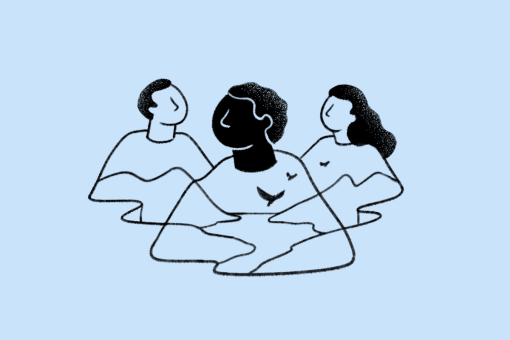We would never dream of telling you what you should do to feel better. That would go against everything we stand for, which is to provide support for mental health self-management.
But we thought we’d give you some tips or strategies to help prevent or reduce your symptoms of anxiety, depression or bipolarity.
You can take them or leave them. Because you’re the only person who knows what’s best for you.
self-management strategies to improve your well-being
A team of researchers surveyed 50 people in the Montreal area living with anxiety, depression or bipolarity to find out which self-management strategies they use to help them feel better.
These strategies were then classified according to five dimensions of recovery: social, existential, functional, physical, and clinical.
Here are 10 of the strategies that were reported:
- Surrounding yourself with people who make you feel good (social dimension): This could mean doing things with friends and family, but also talking to people who are in the same boat as you.
- Taking care of loved ones (social dimension): Helping others, by talking about your experiences, for example, can make you feel better—provided you don’t overextend yourself.
- Adopting a positive attitude (existential dimension): Some ways to achieve a mental change of scenery include looking to the people around you for inspiration, being grateful for the good things in your life, and recognizing how far you’ve come.
- Having a balanced view of yourself (existential dimension): This balance is often thrown off kilter when things aren’t going well. The strategy involves recognizing—and accepting—your strengths and weaknesses and making a distinction between what you’re experiencing (anxiety, depression or bipolarity) and who you are.
- Creating a routine (functional dimension): We sometimes hear that routine is a bad thing, but it also helps us to function. Several people surveyed said that planning out their day—and not just work, school and other obligations, but also their leisure and fun time—made them feel good.
- Taking action (functional dimension): We often feel helpless when confronted with anxiety, depression and bipolarity, but taking action can give us back a sense of control. To stay motivated, many people set set small, realistic goals, or what we call “quick wins.”
- Maintaining a healthy lifestyle (physical dimension): Exercise, eat a healthy diet, go to bed early—we’re told this over and over again. But there’s a good reason for it: It works!
- Managing your energy level (physical dimension): Some situations sap our energy and others give us energy. The principle is simple: Avoid the former (e.g., work less) and gravitate to the latter (e.g., take vacations).
- Seeking professional help (clinical dimension): Whether from a doctor, a psychologist, a social worker or a mental health worker, ask for help if you think you need it.
- Understanding your disorder better (clinical dimension): Many participants said that simply understanding their disorder better (anxiety, depression or bipolarity) helped to lessen their symptoms. You can learn more by attending a conference or by consulting online resources, such as the Getting better... my way tool.
Getting better... my way: A mental health self-management tool
Mental health self-management has many benefits. But what works for one person won’t necessarily work for someone else.
Getting better... my way is a free online tool designed to help you find your own tips and strategies for getting better.
It lists several ways to take care of your mental health, grouped into five categories:
- My difficulties
- My day to day
- My physical condition
- My relationships
- My hope
Once you’ve found the strategies that work best for you, you can develop your own personalized self-management plan.
And if you want support, not only is that possible, it’s actually preferable.
Because it’s been shown that the benefits of mental health self-management are increased when a person is supported by a professional.
Does this approach speak to you? Check out our 5 self-management workshops to learn how to live with anxiety, depression or bipolarity, or to improve your self-esteem or achieve better balance at work.
Explore the self-management workshops
Relief would like to acknowledge the contribution of Charles Saliba-Couture to this post.




